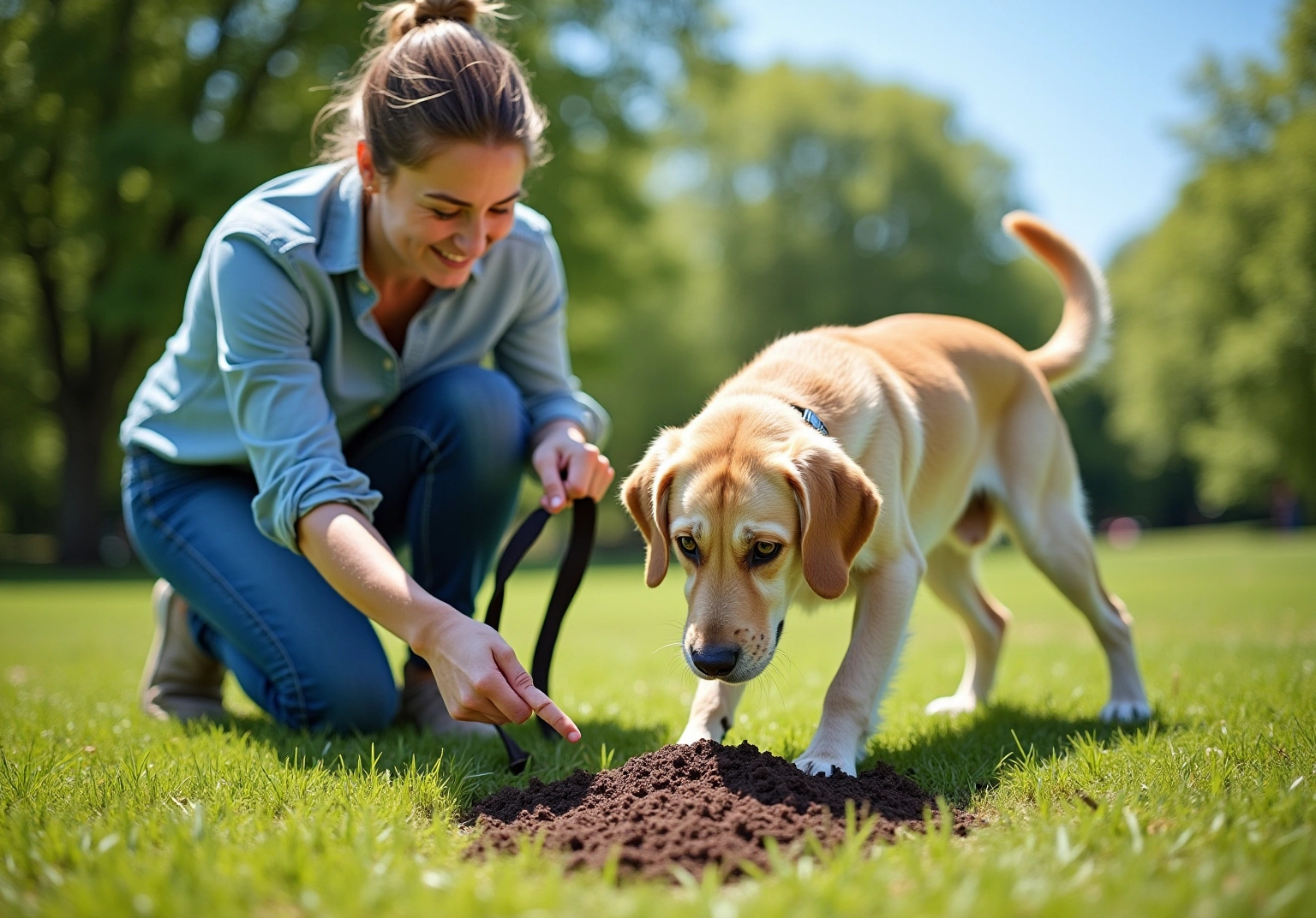
Why Do Dogs Eat Poop? Understanding Causes and Solutions
Overview
It can be distressing for pet owners to discover that their beloved dogs engage in coprophagia, or the eating of feces. This behavior often stems from instinctual actions, anxiety, boredom, or even nutritional deficiencies. Acknowledging these underlying causes is crucial, as it allows us to approach the situation with empathy and understanding. By recognizing that this behavior is not uncommon, we can better support our furry friends in overcoming it.
As caring pet owners, we want the best for our dogs, and addressing coprophagia is an important aspect of their well-being. Improving their diet, engaging in consistent training, and providing ample mental stimulation can significantly reduce this behavior. These strategies not only help to curb the issue but also enhance the overall quality of life for our pets. Remember, you are not alone in this journey; many pet owners face similar challenges and seek compassionate solutions.
By taking the time to understand the reasons behind this behavior, we can create a nurturing environment that fosters our dogs’ happiness and health. Let’s work together to ensure our pets feel secure, engaged, and loved, paving the way for a joyful companionship that thrives on understanding and care.
Introduction
Understanding why dogs engage in coprophagia, or the act of eating poop, can be a perplexing challenge for many pet owners. This instinctive behavior can stem from various causes, including:
- Nutritional deficiencies
- Anxiety
- Learned habits from their mothers
It’s completely natural for you to feel concerned about this behavior, as it can be distressing to witness. By delving into the underlying reasons behind this behavior, you can alleviate your worries and implement effective strategies to address it.
What drives dogs to this seemingly unappealing habit, and how can you foster healthier behaviors in your furry companions? Together, we can explore these questions and find compassionate solutions that prioritize your pet’s well-being.
Explore the Reasons Behind Dogs Eating Poop
It can be concerning for pet owners to discover why do dogs eat poop, a behavior that is scientifically known as coprophagia. Understanding why do dogs eat poop can help alleviate worries about this instinctive behavior. Some dogs may imitate their mothers, who instinctively tidy up after their puppies. Additionally, feelings of boredom or anxiety, particularly when left alone for extended periods, can lead to this behavior. It’s also important to consider that nutritional deficiencies might prompt dogs to seek out nutrients they may be lacking in their diet. By comprehending these underlying reasons, pet owners can approach the behavior of why do dogs eat poop with compassion and care, ensuring their furry friends receive the support they need.
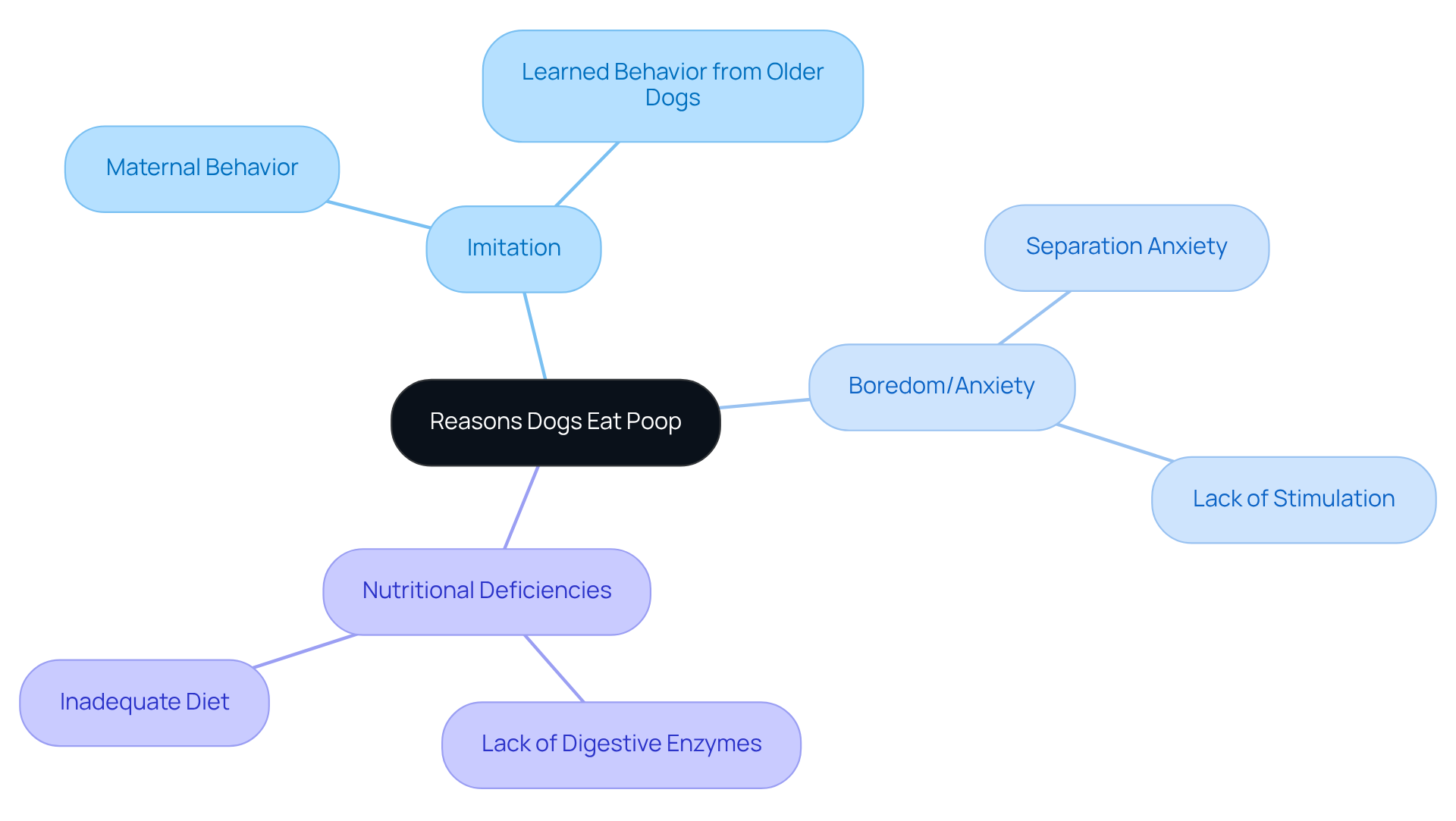
Examine Behavioral and Psychological Triggers
Understanding why do dogs eat poop and the behavioral triggers behind coprophagia in our beloved canines is essential, especially as many of us grapple with the anxiety and stress our pets may experience. It’s heart-wrenching to realize that 58.02% of dog owners have observed their pets acting anxiously around strangers, reflecting a growing concern for the well-being of our furry friends.
When dogs feel isolated or confined, they might resort to eating feces, leading us to wonder why do dogs eat poop as a way to cope, which can be distressing for both the pet and the owner. Furthermore, during potty training, we often wonder why do dogs eat poop, as overly excited or anxious dogs may inadvertently consume their own feces, leaving us feeling helpless.
Alarmingly, dog separation anxiety has surged by over 700% from 2020 to 2022, highlighting the pressing need for us as pet owners to recognize and manage these emotional challenges. By understanding these triggers, we can take proactive steps to alleviate our pets’ stress and anxiety. Engaging our dogs with ample exercise, mental stimulation, and companionship can significantly reduce these behaviors, fostering a healthier and happier environment for them.
Take, for instance, the case of Phineas, a 4-year-old Labrador Retriever. Through dietary adjustments and positive reinforcement training, his feces-eating behavior was effectively addressed, showcasing the power of compassionate care. By acknowledging and addressing anxiety, we can create positive outcomes for our pets, ensuring their happiness and well-being, which may also help us understand why do dogs eat poop.
In conclusion, it is vital to tackle anxiety and stress to prevent inappropriate eating habits, ultimately safeguarding the health and joy of our cherished canines.
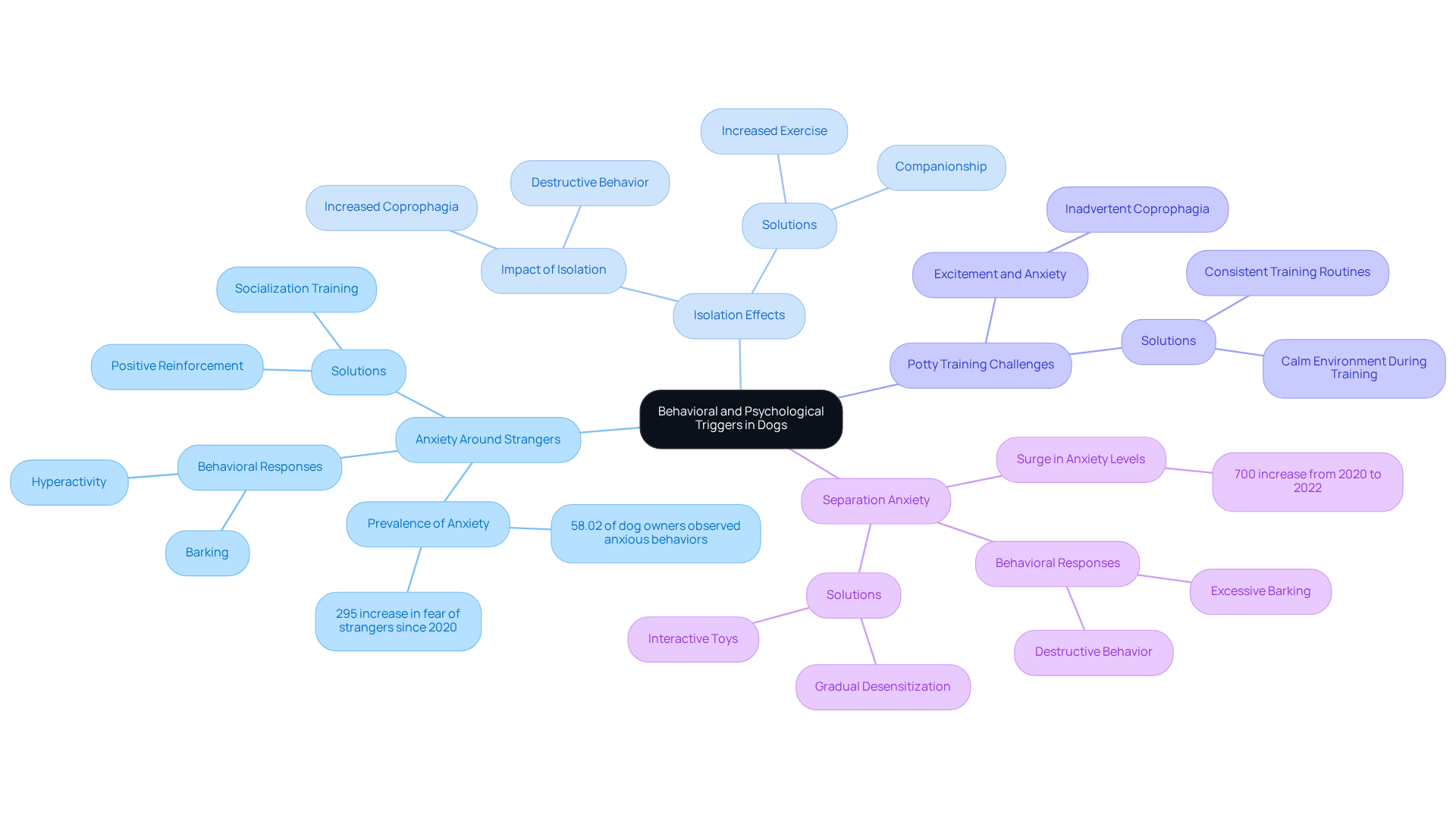
Assess Nutritional Deficiencies and Dietary Influences
As pet owners, it can be truly concerning to witness behaviors like coprophagia, leading us to wonder why do dogs eat poop. This behavior raises the question of why do dogs eat poop, as it often stems from nutritional deficiencies when dogs instinctively seek out essential nutrients that are lacking in their diets.
For example, a diet low in fiber or excessively high in carbohydrates can lead to malabsorption issues, prompting dogs to look for nutrients in feces. A survey of 1,475 dog owners revealed that 16% of pet dogs frequently engaged in this behavior, highlighting how common it can be. Moreover, a significant lack of thiamine can adversely affect nerve tissue, potentially leading to unwanted actions such as stool eating.
To help our furry friends thrive, it’s crucial for us as pet owners to prioritize a balanced diet rich in high-quality ingredients. Providing nourishment involves not just quantity, but also quality, which is essential for promoting their overall well-being and happiness.
By ensuring that our dogs receive the right nutrients, we can not only support their health but also reduce the likelihood of developing unwanted behaviors linked to insufficient nutrition. Remember, we are all in this together, and by taking these steps, we can nurture our pets into happy and healthy companions.
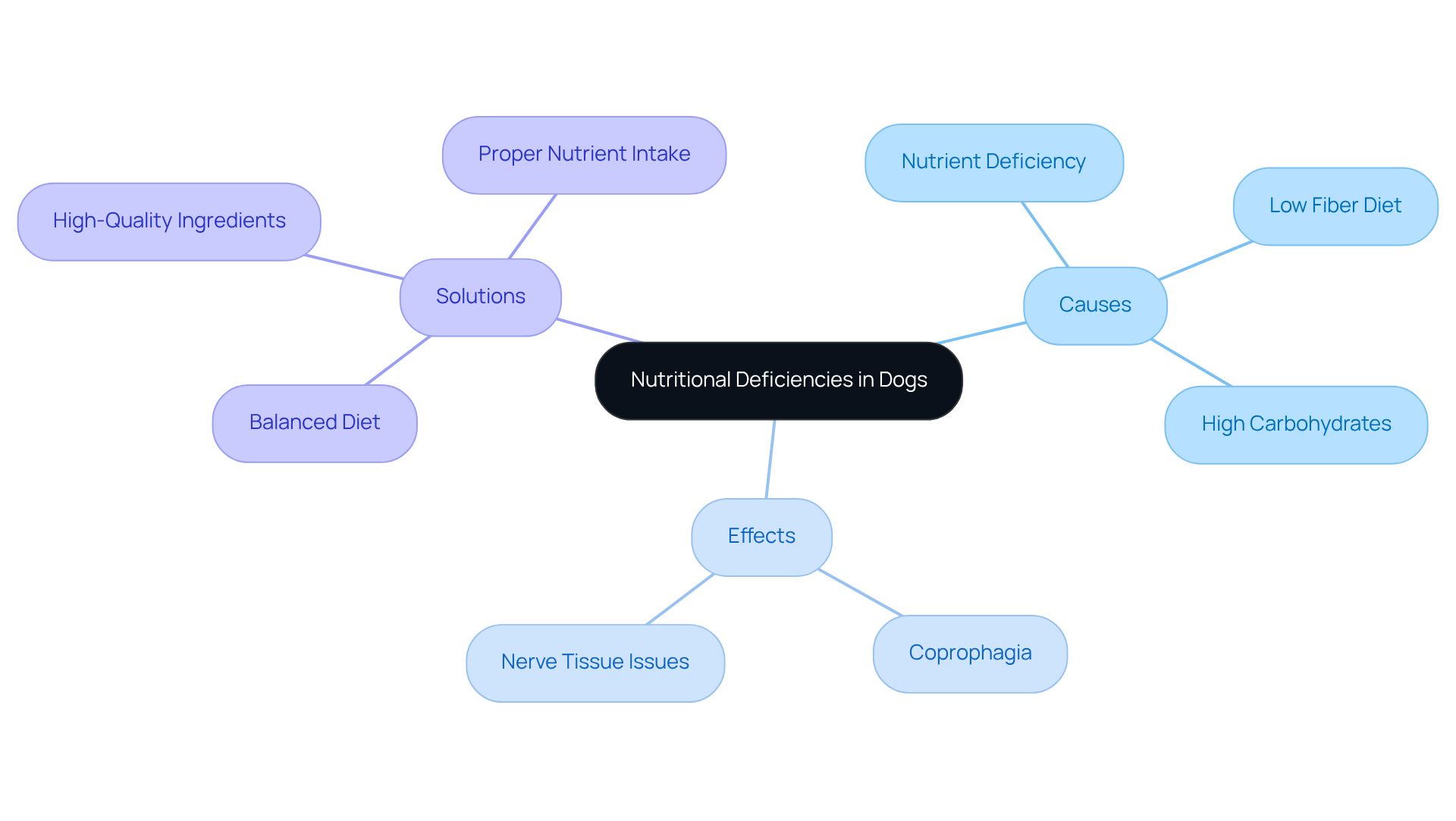
Implement Strategies to Curb Coprophagia
Many pet owners find it challenging to address the concern of feces eating in dogs, leading them to wonder why do dogs eat poop. It’s understandable to feel distressed about this behavior, particularly when considering why do dogs eat poop, as it can be both puzzling and worrying. A clean environment is essential; by promptly picking up feces, you can significantly reduce the chances of your canine accessing them. It’s important to acknowledge that statistics show 22% of dogs engage in coprophagia, with 16% being serious offenders. This prevalence can weigh heavily on your heart as a caring pet owner.
Training commands such as ‘leave it’ can be particularly effective in guiding your dog away from feces and encouraging them to focus on more appropriate behaviors. Utilizing positive reinforcement—rewarding your dog for obeying commands—can enhance the success of this training. Additionally, providing a nutrient-rich diet ensures that your dog receives all the essential vitamins and minerals they need, which may lessen their inclination to seek nutrients in feces.
Regular exercise is also vital, as it helps alleviate boredom and anxiety, both of which can contribute to this behavior. Engaging in behavioral modification techniques, like introducing interactive toys and facilitating social interactions with other dogs, can address the underlying causes of coprophagia. If you’re feeling uncertain about how to proceed, consulting with a veterinarian can offer tailored advice specific to your dog’s needs. This ensures you have a comprehensive strategy in place to manage and prevent this behavior. As Dr. Kathy Wiederkehr wisely points out, understanding why do dogs eat poop is essential for implementing effective prevention strategies, which allows you to nurture your pet’s well-being with confidence.
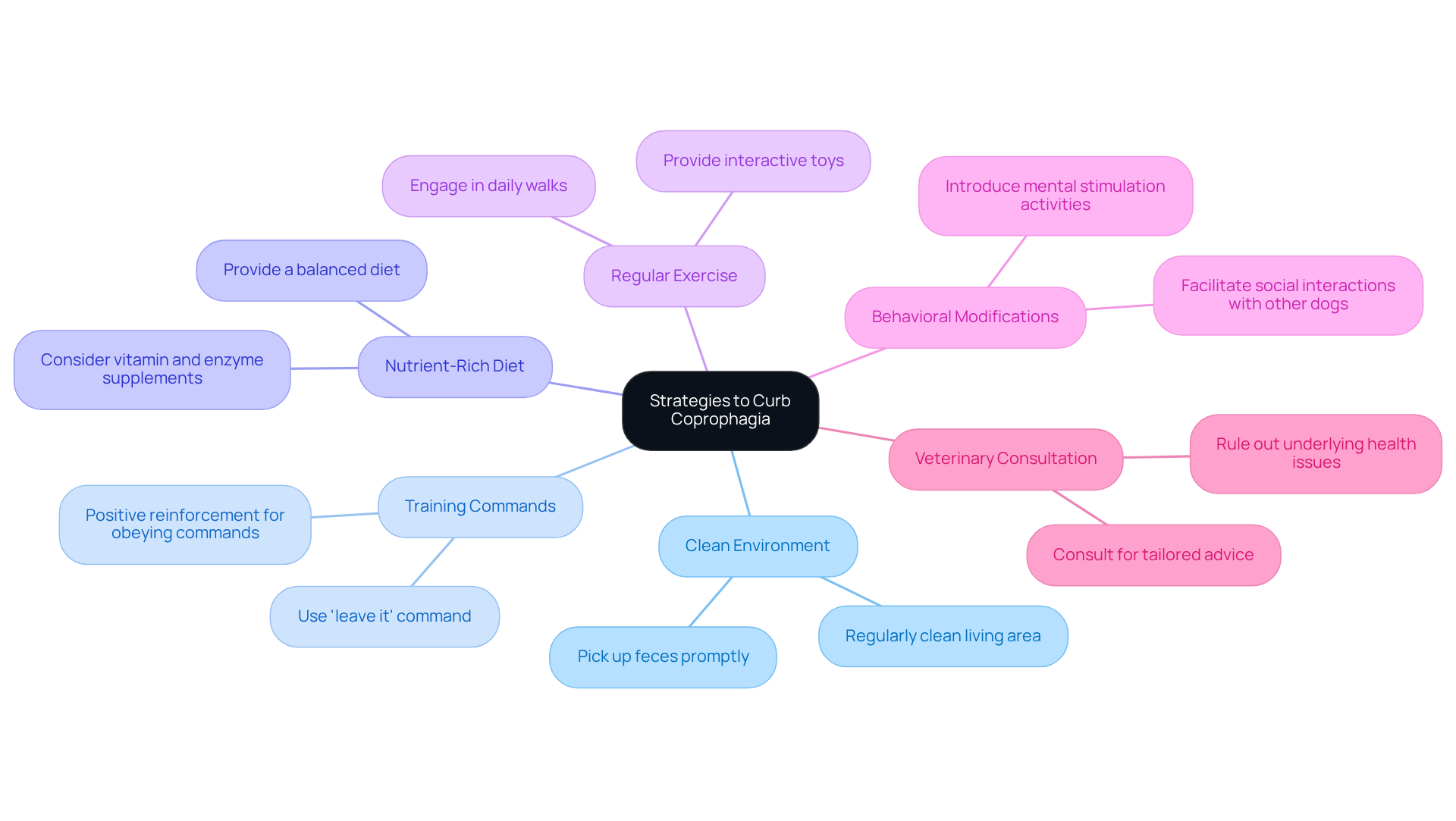
Conclusion
Understanding why dogs engage in coprophagia is crucial for pet owners who are concerned about this behavior. By exploring the underlying causes—such as instinctual behaviors, anxiety, and nutritional deficiencies—we can foster a compassionate and informed approach to managing this issue. Recognizing these triggers allows for a more empathetic perspective, ensuring that our beloved dogs receive the support they need to thrive.
This article highlights several key insights:
- The instinctual tendencies that may drive this behavior
- The role of anxiety and stress in prompting dogs to eat feces
- The importance of a balanced diet in preventing nutritional deficiencies
Strategies like providing mental stimulation, regular exercise, and proper training can significantly reduce the likelihood of coprophagia, leading to healthier and happier pets.
Ultimately, addressing the reasons behind why dogs eat poop is not just about correcting a behavior; it’s about fostering a deeper understanding of our canine companions. By taking proactive steps to manage anxiety, ensure proper nutrition, and implement effective training techniques, pet owners can create a nurturing environment that promotes well-being. Embracing this knowledge empowers us to nurture our pets and cultivate a strong bond, ultimately leading to a more harmonious relationship with our furry friends.
